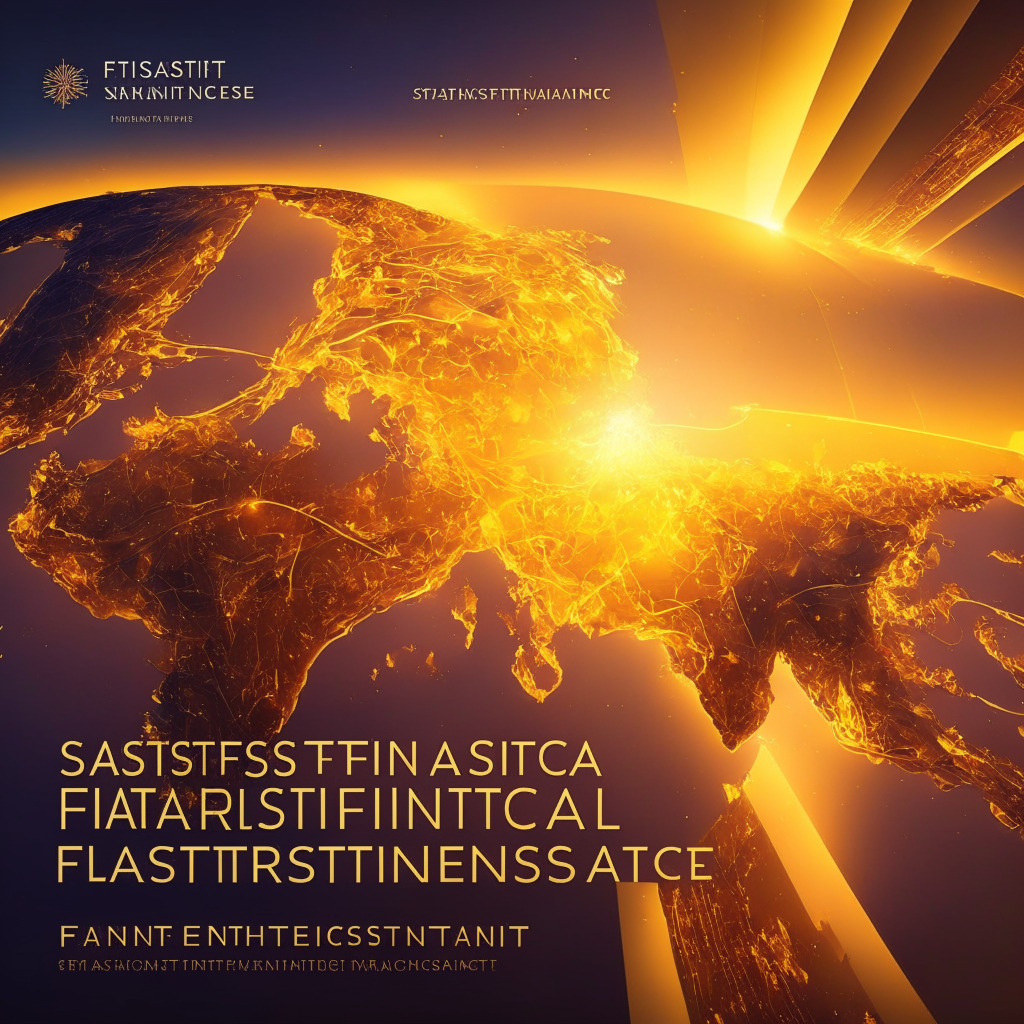The crypto debate in the U.S. has become polarized and politicized, hindering technical discussions on policy and technology. Social media fuels the issue, promoting fear-mongering and limiting productive conversations. A constructive, open-minded approach to discussions is essential for progress and understanding the potential of cryptocurrencies.
Search Results for: Ftx
Navigating the Pathways to Global Crypto Regulation: WEF’s Recommendations & Challenges
The World Economic Forum paper, “Pathways to Crypto-Asset Regulation: A Global Approach,” emphasizes the need for global regulation, collaboration between policymakers and industry stakeholders, and addressing inconsistencies and ambiguity in the crypto market. The paper offers recommendations focusing on sharing best practices and achieving consistency in regulatory frameworks.
The Resurgence of Crypto in Hong Kong: Opportunities and Challenges Ahead
Hong Kong witnesses resurgence in crypto interest, attracting major industry players like Huobi, Gate Group, OKX, and BitMEX. Crypto platforms must comply with new regulations starting June 1 as Hong Kong aims to regain its status as Asia’s leading crypto hub. However, challenges remain including hesitant local banks.
Ethereum Exodus from Centralized Exchanges: Bullish Sign or Cause for Concern?
Ethereum (ETH) held on centralized exchanges hits a near five-year low, with only 17.8 million ETH, representing 14.85% of the total token supply. This decline follows the collapse of the FTX exchange, increased staking, and a trend towards decentralization, but potential risks must be considered.
Binance Australia Struggles: Balancing Crypto Innovation and Regulation
Binance, the world’s largest crypto exchange, faces regulatory scrutiny in Australia, leading to the removal of several spot trading pairs for top cryptocurrencies against the Australian dollar (AUD). This decision highlights the ongoing debate on increasing regulation’s impact on the crypto industry, including its effect on innovation, entrepreneurship, and fostering trust and adoption.
Digital Currency Group Shuts TradeBlock: Market Conditions and Regulatory Challenges to Blame
Digital Currency Group (DCG) is shutting down its institutional trading arm, TradeBlock, amid unfavorable crypto market conditions and an uncertain US regulatory environment. DCG’s closure follows losses surpassing $1 billion last year and financial difficulties within its lending division, Genesis Global. The closure may lead institutional investors to question the digital asset market’s future viability.
Unbanked Closure: A Harsh Lesson on US Crypto Regulations and Industry Growth
Crypto fintech firm Unbanked announced its closure due to the harsh regulatory environment for cryptocurrencies in the United States. Despite partnerships and attempts to operate legally, excessive costs, wasted time, and unfulfilled funding led to the company’s downfall. Unbanked’s situation raises concerns about whether strict regulations hinder the long-term growth and mainstream acceptance of cryptocurrencies.
TradeBlock’s Demise: Examining Regulatory Challenges and Crypto Industry Growth
TradeBlock, a subsidiary of Digital Currency Group, is reportedly closing down due to factors including the crypto winter and challenging US regulatory environment for digital assets. This highlights the need for regulators and market participants to find common ground, balancing regulatory requirements with industry growth to tap into blockchain and cryptocurrency opportunities.
DCG Shuts Down TradeBlock: Analyzing the Crypto Winter’s Impact on Industry Future
The Digital Currency Group (DCG) plans to close its prime brokerage subsidiary, TradeBlock, due to the ongoing crypto winter, uncertain regulatory environment, and broader economic challenges. The closure raises concerns about the cryptocurrency industry’s future and emphasizes the need for better cooperation and global coordination among stakeholders, regulators and international organizations to ensure consistency and clarity in crypto asset regulation.
Norway’s Central Bank Pushes for National Crypto Strategy Amid EU’s MiCA Regulation
Norway’s central bank, Norges Bank, urges the country to develop a national crypto regulation strategy as the EU’s MiCA regulation approaches. Despite MiCA’s focus on consumer protection and market integrity, it lacks comprehensive decentralized finance regulation. Norges Bank emphasizes the importance of understanding the evolving crypto landscape to foster responsible growth and innovation.
Crypto Consortium Fahrenheit Acquires Celsius Network: Implications and Legal Battles in the Crypto World
The crypto consortium Fahrenheit acquires the insolvent lender Celsius Network, gaining ownership of its institutional loan portfolio, staked crypto assets, Bitcoin mining unit, and other crypto-related investments. Estimated liquid cryptocurrency received: $450-$500 million. Additionally, Bitpanda collaborates with Coinbase to offer digital assets to European clients, and Bitfinex invests in Chilean crypto firm Orionx, promoting financial freedom in Latin America.
Massive Bitcoin Whale Shifts $822M: Impact on BTC Price Momentum and Market Trends
Blockchain intelligence firm Arkham reports a significant movement of over 31,000 Bitcoins from a prominent whale’s cold wallets, raising questions about its impact on Bitcoin price momentum. These wallets remained inactive since 2022 and received 21,600 BTC from exchanges like Binance and Huobi. Large transactions can significantly influence market trends, requiring thorough research for informed investment decisions.
Balancing Crypto Regulation: Fostering Innovation vs Mitigating Systemic Risk
The European Systemic Risk Board report states that the current economic impact of the crypto industry is minimal, but recommends EU bodies to actively monitor and mitigate potential risks, particularly in leveraged trading, as the sector is growing and highly volatile. Cooperation between countries is essential for maintaining low economic impact due to cryptocurrencies’ cross-border nature.
US Crypto Crackdowns: CFTC vs SEC, Challenges, and the Future of Offshore Operations
The CFTC has warned crypto companies not to perceive it as a more lenient regulator compared to the SEC, as around 20% of its portfolio now consists of cryptocurrency cases. Both regulatory bodies are committed to understanding and regulating the emerging crypto market, debunking any notion of a “light touch” approach.
Binance Accused of Commingling Funds: Transparency vs Reputation in Crypto Exchanges
Reuters alleged that Binance, a prominent cryptocurrency exchange, has been commingling customer funds with company revenue, sparking concerns of a lack of internal controls. This scenario underscores the need for better regulations, increased transparency, and proper handling of customer funds in the cryptocurrency industry.
Global Crypto Regulation: Analyzing IOSCO’s Recommendations and The Future of the Industry
The International Organization of Securities Commissions (IOSCO) has released a report proposing 18 recommendations for global crypto regulation, covering areas like conflicts of interest, cross-border risks, and market manipulation. Public consultation on these recommendations is open until July 31, potentially shaping the future of cryptocurrency regulation worldwide.
Crypto Regulation Showdown: Balancing Innovation & Investor Protection in a Decentralized World
The International Organization of Securities Commissions (IOSCO) seeks public comment on policy recommendations for crypto and digital asset markets, addressing market abuse, client asset protection, and disclosures. Their Fintech Task Force aims to establish a regulatory agenda for fintech and cryptocurrency industries, with oversight from the Monetary Authority of Singapore. Recent events highlight the need for increased regulation, and IOSCO’s initiative seeks to create a more secure environment in the digital asset industry.
Crypto Trading Evolution: Hidden Road & Crossover Markets Partnership Pros and Cons
Customers of Hidden Road can soon access Crossover Markets’ crypto trading platform, helping institutions avoid conflicts of interest by separating trade execution from custody and brokerage services. The collaboration offers streamlined crypto trading but raises questions about liquidity and settlement times on an execution-only platform.
Crypto-Friendly Presidential Candidate: Sen. Tim Scott’s Vision for US Digital Assets Future
Sen. Tim Scott announces his bid for US president with a focus on establishing a digital assets regulatory framework that safeguards consumers and encourages innovation. As the ranking member of the Senate Banking Committee, Scott aims to develop a comprehensive approach covering blockchain, digital assets, and consumer protection, emphasizing consumer safety, accessibility, and industry growth.
BlockFi Restructuring Controversy: Emerging Divide and Stakeholders’ Dilemma Explained
BlockFi retracted earlier statements about its reorganization plan, which now faces opposition from the Official Committee of Unsecured Creditors. The conflict revolves around the plan’s impact on stakeholders and addressing the company’s misconduct-related issues, raising questions about BlockFi’s future in the crypto lending industry.
Bankruptcy Woes: Core Scientific Struggles Amid Crypto Regulation Uncertainty
Core Scientific, once the largest crypto mining company, is struggling under bankruptcy and creditor pressure amidst evolving cryptocurrency regulations. As the business landscape changes, adaptability is crucial for the ever-maturing crypto industry.
BlockFi Bankruptcy Battle: Examining the Controversy and Balancing Innovation with Regulations
BlockFi’s bankruptcy battle faces tensions with creditors citing poor management and restructuring plans. A withdrawn wind-down plan suggested recovering funds through claims against commercial counterparts, but a corrective letter clarifies that soliciting acceptances remains unlawful. An upcoming hearing on June 20 will determine BlockFi’s legacy.
Hotbit Closes Shop: Centralized Exchanges’ Future in Jeopardy or Crypto Evolution?
Hotbit announces the end of its centralized exchange operations amid a rapidly-changing crypto landscape. The decision marks a turning point, sparking debates on the viability and stability of centralized business models as decentralized businesses gain focus in the industry.
Centralized Exchanges’ Future: Risks, Regulation, and Decentralization Debate
The future of centralized exchanges like Hotbit and Bittrex seems uncertain amid deteriorating operating conditions, collapsing institutions, and increased regulation. As the crypto industry grapples with centralization versus decentralization, alternatives like holding one’s own crypto or trading on decentralized exchanges gain momentum. Reevaluation of existing models and exploration of options addressing operational and security concerns are essential for the crypto ecosystem’s maturity and adaptability.
Hotbit Shutdown Sparks Crypto Exchange Debate: Centralized vs Decentralized Future
Crypto exchange Hotbit announces cessation of operations due to deteriorating conditions, citing former team member investigation, FTX collapse, USDC depegging, and funds outflow from centralized exchanges. Hotbit’s situation highlights the need for exchanges to balance security, decentralization, and regulation for long-term success in the evolving crypto world.
PSYOP Token’s 1000% Surge: Legitimate Investment or Scam Controversy?
The PSYOP Token’s recent 1,000% surge raises legitimacy concerns, with backlash against creator Ben.eth. Despite controversy, it will be listed on Binance, potentially boosting value. Alternative meme coins Copium, Sponge, and AiDoge show great potential and investor caution is advised.
Ethereum Self-Custody Solutions Surge: Casa Controversy and the Future of Crypto Security
The demand for Ethereum self-custody solutions is growing, driving companies like Bitcoin wallet provider Casa to offer Ethereum support. Casa aims to simplify self-custody by incorporating best security practices, making it more enticing for users to control their crypto assets instead of relying on centralized exchanges, thus enhancing security.
Sanctioned Ethereum Wallet Sparks Debate: Cryptocurrency Convenience vs Illicit Activities
The U.S. Treasury’s OFAC has imposed sanctions on Russian firms and individuals, including an Ethereum wallet, for assisting Russia in evading existing punitive measures amidst the Ukrainian conflict. The case underscores the dual nature of cryptocurrencies as convenient cross-border transaction tools and potential means for illicit activities, emphasizing the need for balancing their benefits with security safeguards.
MIAX Acquires LedgerX: A Strategic Move for Swaps and Futures Market Expansion
MIAX, a subsidiary of Miami International Holdings, completed its acquisition of LedgerX, a regulated exchange and clearinghouse. This move supports MIAX’s growth strategy, allowing for the expansion of its capacity to introduce innovative products into the swaps and futures industry.
Coin Cafe’s $4.3M Repayment: A Call for Better Crypto Regulation or Stifling Innovation?
The recent Coin Cafe case, where the New York Attorney General secured a $4.3 million repayment for undisclosed fees, emphasizes the growing need for better crypto regulation. Striking a balance between investor protection and enabling innovation is crucial for the future development of cryptocurrencies and blockchain technology.
Undervalued Litecoin and Stablecoin Stalemate: The Future of Crypto in a Dynamic Landscape
This article highlights Litecoin’s market value to realized value (MVRV) Z-score as undervalued, JPMorgan’s report on stablecoin market recovery, and Hong Kong’s pursuit of a transparent regulatory framework for digital assets amid evolving crypto landscape filled with opportunities and challenges.































